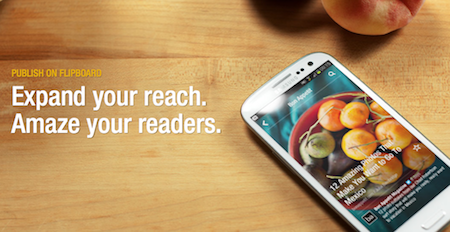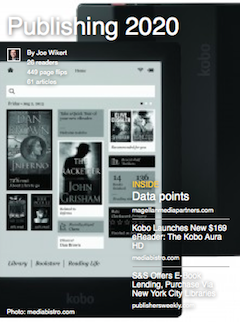
If you haven't checked out Flipboard yet, I recommend you take a look soon. I'd heard about Flipboard but hadn't looked into them until I read Joe Wikert's article this morning. Wikert digs deep into his reason for creating a Flipboard magazine. But before I get into that, here's a little about what Flipboard is:
What is Flipboard?
It's an iPhone and iPad app that allows anyone to curate content from around the web, make your own comments on it, and publish an eMagazine collecting whatever selections of that content. Here's how they describe themselves on their homepage:
Find everything that matters to you from world news to life's great moments. Just tap the [+] to save anything from the web - stories, photos, audio and more - into your own magazines to flip through later or share with friends.
Right now Flipboard is only available on Apple devices, so you can't read it on the web. If you're an Apple user, it's a powerful way to pull content together and display it within the context of your own e-publication.
Curation as Creation
The power of curation to me is that it makes the content personal without making it trivial. It's easy to say you like something (or give it a click on whatever site), but it takes more time an effort to seek out a collection of content that is of high quality around a coherent theme. Curation is not just about what content you LIKE, but about what content you LIKE + WANT TO SHARE. I think it goes even a step further than a ReTweet or a Share on Facebook.
When you curate a particular piece of content and take the time to comment on it, whether that's on a blog, through Flipboard, or on any other platform, you are engaging with and augmenting that content. It's a bit like what a rapper does with a DJ's mix, or how background music works in a movie, or even how dinner party conversation happens around a particular story someone tells.
In each of those cases, the initial piece of "content" (meaning the instrumental track, the movie, or the story) stands strong on its own, but when others key on that content as important and make it stand out by choosing to feature it and augment it, it becomes something more. A beat hits harder with good lyrics, a chase scene is more riveting with music to drive the tension, and a conversation goes deeper when questions follow a story.
My favorite example of a content curator is BrainPickings.com. Blogger Maria Popova started publishing amazing excerpts from print and online content years ago, and she's drawn a huge following because of it- me included. In many ways she has been doing what Flipboard allows anyone to do with her blog for a long time.
Other people take a similar approach with their Twitter account and tweet out a string of links that they can also look back on.
Publishing 2020

In Wikert's article, he writes about finding a middle ground. He starts by talking about the different social media and content curation tools he's used, from Twitter to Zite and others. He says he created a Flipboard for a very specific reason:
"I see Flipboard magazines filling a nice, comfy space between Twitter and blogs. I read articles throughout the day and some of them are tweet-worthy. But the best deserve more commentary or context than I can squeeze into 140 characters. That’s where a Flipboard magazine comes in."
I think he's spot on.
Wikert is doing just that for publishing in his own Flipboard magazine called Publishing 2020. It's a great publication about the future of publishing and I recommend you check it out.
Curation as publishing
Some people question me when I talk about curation as a form of publishing. They say that repurposing content that you didn't create isn't the same as creating content and that somehow it's not on the same level. I disagree.
Knowing how to find, comment on and compile good content is more important than ever, as there is more content than ever out there. It's a skill that has always been valuable, and is emerging as critical in new media publishing.
And the fact that we are still working on developing beautiful and simple tools to do it is downright exciting.
Have any of you used any good content curation tools? What was your experience like?
Images courtesy of screenshots from Flipboard.com and Publishing2020

0 comments